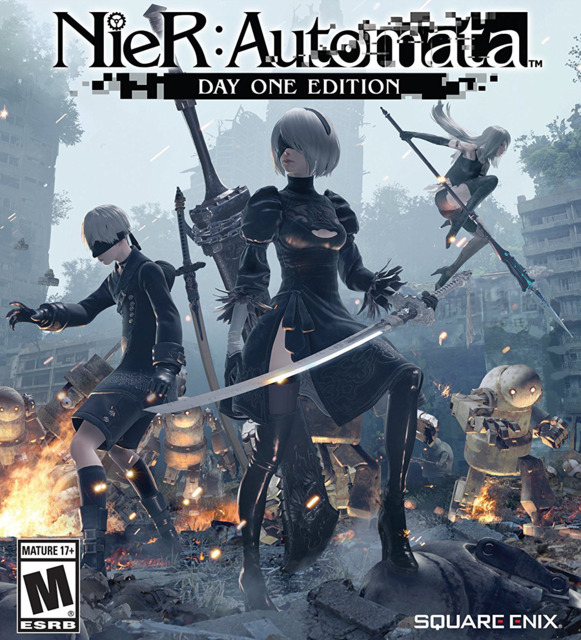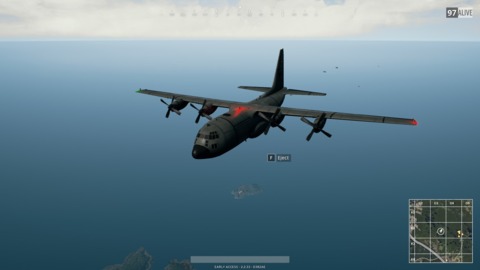All-New Saturday Summaries 2017-05-13
By Mento 0 Comments
We're reaching the end of the second week of May and I haven't been making as much progress in May Maturity as I'd hoped. Two games in two weeks isn't bad by any standard metric, but I expected these older games to move a little quicker. It is fair to say that there's some heavy distraction from my two other ongoing features - The Top Shelf demands a lot of research and writing, more of the latter than the former if I'm being honest, and I always drop everything to play through the Indie Game of the Week - but I'm hoping we're still on pace for my minimum goal target of five old games this May at least. We'll get more into that in a bit. For now, I want to talk about zeitgeists.

This year's already been a hard one for me, as someone who has waited years for many of 2017's games and can only sit there plugging my ears as everyone discusses the new Nier, the new Persona, the new Yakuza and the new Zelda in varying levels of detail. I mean, the fault's all on me and my parsimony of course, but it also factors into a secondary reason why I don't immediately jump on a new release. When a popular new game hits the zeitgeist, it's very difficult to aggregate and parse your own thoughts on that game. Easier for established critics and journalists, because they have that calm before the release window where the only other people playing it are those like them who are sworn to a similar level of secrecy, but once a game is released everyone has an opinion on it, and often their own content - whether that's a written or video review, an LP (well, except for Persona 5, I suppose), or some manner of long-form article addressing one or more of its characteristics and/or themes. With all that out there circulating, even if you're not actively seeking it out to consume any of it, I feel a lot still gets through via scuttlebutt osmosis (the second worst type of butt osmosis). I suppose being around social media is a major culprit of that too, where a thousand tweet reactions to a new game on your timeline become all that much more difficult to ignore, even if you were to start messing around with text filters. When I critique games it's usually some time after their original release, when the initial furor has died down and I can better personalize my own take rather than unconsciously draw from the comments and reservations being made by others on my periphery.

There are exceptions to this approach, however, and they invariably involve online multiplayer games that live or die on the amount of attention they're receiving at any given moment. I deeply regret that I currently have no way to play PlayerUnknown's Battlegrounds: a game I would normally not be all that interested in, if not for how much fun various livestreams have made it seem. Between Giant Bomb's doomed attempts to escape a deadly shack and Austin Walker's tutelage of "good murder son" Patrick Klepek in Waypoint's endeavors, it's become this year's Hitman in terms of generating a heap of quality passive entertainment (though hopefully not like Hitman in other aspects, chief of which is getting its ass canned by an unfeeling Japanese giant). I hold out hope that PUBG hits the PS4 flying out of a plane guns blazing, though I wonder if it'll find as big an audience by then. Depending on how long it takes, it'll either be showing up just as everyone gets burned out on the PC version and ready to try the next new online hotness, or a little after that when everyone's had enough time away to be ready to leap back into a significantly improved final version. I'm hoping for the latter, naturally enough, though I also wonder if I myself won't get so burned out on the streams that my interest will have waned. I suppose in that case I'll at least have saved myself some money. It always comes back to that darn parsimony again.
Speaking of a great deal, we have no less than four new blogs for you all to check out this week, with one more coming later today (don't be surprised if I bolt it onto the end here in a later edit, and also don't be equally nonplussed if I forget to delete this parenthetical once I've done so):
- The Top Shelf this week had the unenviable task of processing the one-two megapunch that is Metal Gear Solid 3: Snake Eater and Garfield, the PS2 Garfield game. Hopefully I didn't offend the huge fanbases of either with my frank appraisals. The feature has also just hit 2005, which means we'll be winding down to a close for the first round relatively soon - since November 2005 is the release month of the Xbox 360, we'll see a lot of developers (and myself, eventually) switching over to the next console generation. I'm excited to actually start playing some of those "Considered" games in the next round, provided I can survive the old game deluge of this month.
- The Indie Game of the Week is Telltale's Tales from the Borderlands for a third and final time. We discussed the final episode in-depth, and then moved onto a character study since I had thoughts on how many of the major characters were treated throughout the five-part series. The episode rundown and character stuff are hidden behind spoiler sections, so if you just wanted to know how I felt about the game post-completion in a general, non-spoilery sense it's there for your perusal.
- Last weekend saw us finish off the 1996 graphic adventure game Toonstruck, which I felt found the right balance of typical LucasFilm/Sierra puzzle logic, great writing and performances, and a presentation that used FMV but was sparing about it, which I definitely found preferable to constantly taking player control away for an endless parade of cutscenes about, say, invisible daughters and fucking pizza, hypothetically speaking. As the first "Outro" for May Maturity, I expounded on my final thoughts about the game in more detail.
- The conclusion of one Outro immediately brings with it the next game's Intro, and that's what I provided for our second game of May Maturity 2017: Origin's Ultima Underworld: The Stygian Abyss. While Ultima and I have never really been on speaking terms, the 1992 offshoot Underworld is lauded as a major touchstone in the evolution of computer RPGs and I felt compelled to fill in that important gap in my historical gaming knowledge - significantly, it broke away from the fixed four-directional movement of other dungeon-crawlers and introduced the possibilities of RPGs with fully 3D environments (in the sense that you have full panoramic movement, not so much that everything is polygonal) paving the way for the original Elder Scrolls game, Arena, as well as the amazing Might & Magic VI and VII. The opening few hours of the game impressed upon me how deserved that acclaim is, even a quarter-century after the fact, and was sufficient motivation to spend the following week reaching the game's conclusion.
- And that conclusion will be covered by Ultima Underworld's Outro, along with a whole mess of observations and critiques as I render my final verdict on this relatively ancient trailblazer. What was most remarkable is that Ultima Underworld feels more like an adventure game than most of its genre, in a fashion similar to the original Dungeon Master. You're there to kill monsters and find treasure, to some extent, but the real goal is to solve the dungeon's many mysteries in order to escape, which meant regularly jotting down clues and backtracking to certain NPCs and areas that didn't seem to serve a purpose previously. You really have to pay attention, and that's rare for many games these days that try not to tax you too much mentally if they can help it (which, fair enough if you posit video games as largely being a post-work, stress-alleviating comedown).
Anyway, that'll do it for this week's Summaries. As before, my entire game-playing time is spent on those I'm already writing about in-depth, leaving nothing for the usual game-specific round-ups here. Along with a hotly-anticipated Summer playthrough of Final Fantasy XV, I also bought Dragongrampa 1.2 Reload in the current EU PSN sale this week and hope to one day soon finally determine what that anime world of precocious Japanese schoolkids and murder bears is all about. Until then, there are my usual weekly features if these older games aren't grabbing you (though, uh, I did kinda figure out a way to integrate next week's Indie Game of the Week into the theme I've got going on here).
Thanks for reading any or all of the above, at any rate, and I'll see you all again for another Saturday Summaries in a week's time. (And congrats once again to new staff @benpack and @ybbaaabby for your flawless integration into your respective coastal madhouses.)
